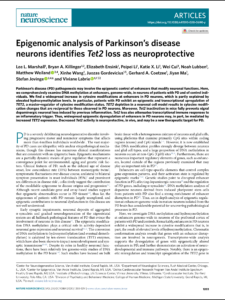Abstract: “Parkinson’s disease (PD) pathogenesis may involve the epigenetic control of enhancers that modify neuronal functions. Here, we comprehensively examine DNA methylation at enhancers, genome-wide, in neurons of patients with PD and of control individuals. We find a widespread increase in cytosine modifications at enhancers in PD neurons, which is partly explained by elevated hydroxymethylation levels. In particular, patients with PD exhibit an epigenetic and transcriptional upregulation of TET2, a master-regulator of cytosine modification status. TET2 depletion in a neuronal cell model results in cytosine modification changes that are reciprocal to those observed in PD neurons. Moreover, Tet2 inactivation in mice fully prevents nigral dopaminergic neuronal loss induced by previous inflammation. Tet2 loss also attenuates transcriptional immune responses to an inflammatory trigger. Thus, widespread epigenetic dysregulation of enhancers in PD neurons may, in part, be mediated by increased TET2 expression. Decreased Tet2 activity is neuroprotective, in vivo, and may be a new therapeutic target for PD.”
Marshall LL, Killinger BA, Ensink E, Li P et al: Epigenetic analysis of Parkinson’s disease neurons identifies Tet2 loss as neuroprotective. Nature Neurosci. 23(10): 1203-1214 (2020).
